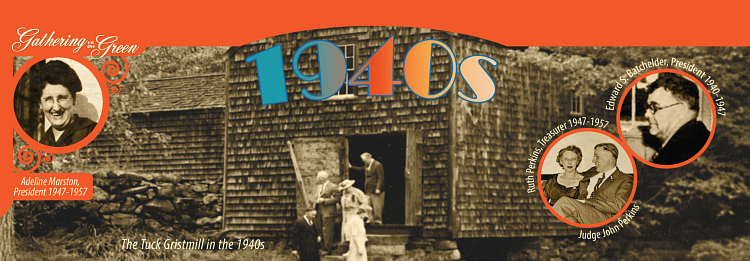'Owing, perhaps, to the unusual times' (as Vice President Emily Hutchings so aptly put it), this was a quiet decade for the Association, with few visitors to the Historical Room. With gas rationing in effect until 1945, driving for pleasure, such as traveling to a social gathering or to view historical items, could result in the loss of one's gas ration card. As for the Association, it spent money on a new steam heating system for the house and little else.
When Adeline Marston took the gavel in 1947, one of her first actions was to call a summer gathering, the first of its kind on record. That meeting marked the beginning of the end for the old log cabin meeting house, as its deteriorated condition had some persons in attendance questioning the 'advisability of rebuilding it.' John Perkins suggested the 'matter be passed over on account of the high cost of building.' Perkins, a lawyer and a judge, had recently finished a term on the Governor's Executive Council. Who was going to disagree with him? The cabin was quietly torn down and removed from the property.
Honorary member Rev. Roland Sawyer championed an Old Home Day to mark the Association's 25th anniversary in 1950. After nearly 20 years, Vina Jones, the widow of founder Ira Jones, resigned as Treasurer and was replaced by Ruth Perkins. Retired teacher Anna May Cole compiled lists of early settlers and gave talks on local history. Custodian Alice Taylor passed away and her duties were assumed by Mr. and Mrs. William Whitehouse. President Marston, the teacher for whom Marston School is named, proposed that the town's history be taught in the grade schools (with special programs offered by the Historical Society, that course is still taught today).
The formality of the past was gradually fading. Women still retained their titles of Mrs. or Miss, but men were generally referred to by name only. Prayers still opened meetings, but the singing of patriotic songs was largely a thing of the past. On one occasion a recording of 'God Bless America' was played and at other meetings there was a salute to the flag. Historians were Annie Marston True (1940-1946) and her daughter Esther True Davis (1946-1950). The Association ended the decade with $3,655 in the Treasury.





